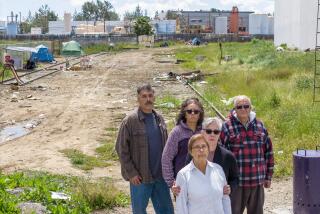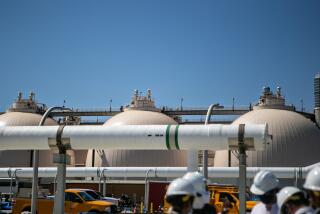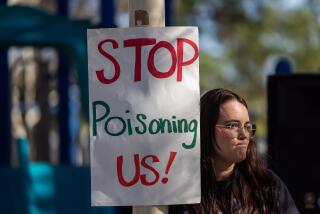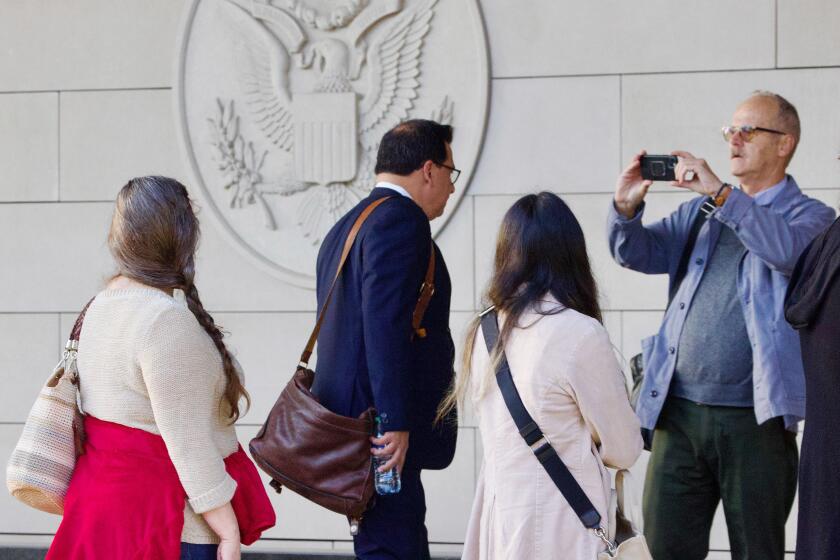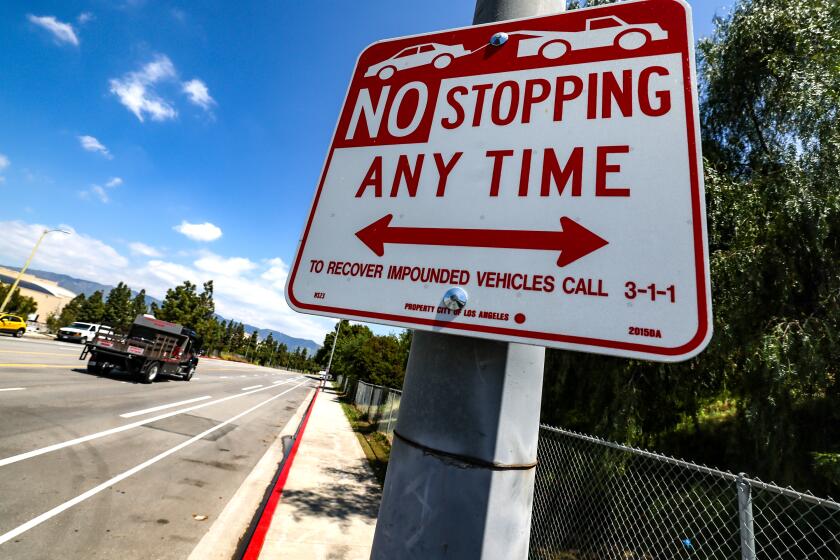Exide ordered to clean up toxic substances near Vernon plant
The state Department of Toxic Substances Control has issued an emergency order directing a Vernon battery recycler to clean up lead and other metals that have been deposited near the Exide Technologies plant.
In a letter released Wednesday, the agency said dust and soil samples with metals in concentrations at or near hazardous waste levels have been found near the facility and must be cleaned up by Jan. 31. The order is urgent, the agency wrote, because winter rains could wash the metals into the Los Angeles River.
“DTSC considers the elevated concentrations of lead and other contaminants … an immediate threat to human health and the environment (i.e. the Los Angeles River),” regulators wrote to Exide, one of the world’s largest battery recyclers. Exide has until Dec. 31 to come up with a work plan.
The agency’s letter does not say where the high concentrations of lead were found, but notes they were within 1,500 feet of the plant and in two storm drains along Bandini Boulevard.
Agency officials also noted in a separate memo earlier this month that “lead...and arsenic was detected in several locations in residential areas.” It did not specify the concentrations near residential areas, only that they are above the Environmental Protection Agency’s regional screening levels but below hazardous waste levels.
Exide officials could not be reached for comment. But residents living near the battery plant and their advocates said they were alarmed.
Msgr. John Moretta, the pastor at Resurrection Catholic Church in Boyle Heights, where a group of residents has been pushing regulators for years to do more to curtail pollution from the plant, said this is a “reason to shut them down.”
“They have not been good neighbors,” he said. “All these years of abuse, all these years of uncontained pollution … people are complaining of aggravated asthma, incidents of autism, incidents of neurological problems.”
The state’s emergency order comes as the South Coast Air Quality Management District is pursuing its own petition calling for a halt to lead smelting operations at Exide “until its air pollution control systems are improved and deemed adequate” to control toxic emissions.
A hearing board for the air district is now taking testimony on that petition, including from residents who say their health is threatened and from Exide officials who say the plant should be allowed to stay open and that emissions have plummeted in recent months.
Exide has been the focus of intense attention from elected leaders, residents and officials since a health risk assessment released earlier this year by the air district found that the plant was posing an elevated cancer risk to 110,000 people living in communities stretching from Boyle Heights to Huntington Park because of arsenic emissions.
The plant, which opened in 1922 and was taken over by Exide in 2000, has been cited several times in recent years, often for exceeding permissible levels of lead.
In April, the toxics department, which oversees the plant, moved to shut it down temporarily, citing health risks, but Exide appealed and a judge allowed the plant to resume operations.
The state entered into an agreement with the company in which Exide agreed to spend $7.7 million for a new storm water system and improvements to reduce arsenic emissions.
It also agreed to sample dust and soil in the neighborhood around its plant to determine whether dangerous metals have accumulated and are posing a health risk to the community.
Lead is a potent neurotoxin. Children are more vulnerable than adults and can suffer learning disabilities even with limited exposure. Arsenic, a carcinogen, can also cause nausea, decreased blood-cell production and abnormal heart rhythm.
Soil and dust samples were collected in August and October. Based on the results, the toxics agency this week told the company it must take more samples beyond 4,500 feet from the plant’s perimeter, to make sure toxins have not spread further.
Among the many issues with Exide is the fact that the plant has been operating for decades without a full permit as required by the 1976 federal Resource Conservation and Recovery Act. Instead, the plant has been on “interim status” the entire time.
Also on Wednesday, state Sen. Kevin de Leon (D-Los Angeles) said he intends to introduce legislation requiring the state toxics department to speed up permitting decisions. State Sen. Ricardo Lara (D-Long Beach) also recently announced his own proposed legislation requiring all hazardous waste facilities in the state to get a final permit by 2015 or be shut down.
“It is extremely frustrating that people in disadvantaged communities continue to suffer from high levels of pollution ... that are allowed by DTSC to continue to operate for years and even decades,” De Leon said. “It’s time to say stop. Facilities not in compliance with the law must be shut down.”
More to Read
Start your day right
Sign up for Essential California for news, features and recommendations from the L.A. Times and beyond in your inbox six days a week.
You may occasionally receive promotional content from the Los Angeles Times.
